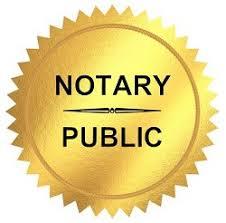Demystifying Notarial Work: Simplifying the Role and Relevance of Notaries
Their function, typically shrouded in enigma for lots of, carries significant weight in making sure the legitimacy and honesty of important papers. By unwinding the intricacies shedding and surrounding notarial techniques light on the relevance of their acts, a clearer understanding emerges of the essential duty notaries play in maintaining the textile of lawful and legal contracts.
The History of Notarial Work
Exactly how did notarial work evolve over time to come to be an indispensable part of lawful and business deals? The history of notarial work go back to ancient human beings, where scribes played an important duty in tape-recording crucial info and confirming files. As societies advanced, the requirement for an extra formalized system to make sure the legitimacy of arrangements occurred. This led to the advancement of notaries, people selected by the state to serve as unbiased witnesses in legal matters.
Throughout the Center Ages, notaries got prominence in Europe, with their features broadening to include preparing legal documents, licensing trademarks, and preserving records. The rise of international trade better highlighted the significance of notarial operate in validating agreements and arrangements throughout borders.
In the modern period, notaries continue to play an important role in lawful and service purchases by validating identities, verifying the credibility of documents, and protecting against fraud. Their duty in certifying the credibility of arrangements includes a layer of safety and security and depend the ever-evolving landscape of business and regulation.

Duties and Responsibilities of Notaries
The historical evolution of notarial job from old worlds to the modern-day era has shaped the unique obligations and responsibilities that notaries promote in lawful and service purchases today. Notaries play a vital function in confirming the credibility of records and the identification of signatories. Among their main obligations is to witness the finalizing of vital files, such as agreements, deeds, and wills, to ensure that all events are getting in right into arrangements purposefully and willingly. Notaries also validate that signatures are of sound mind and not under discomfort or threat.
They certify duplicates of original papers, providing guarantee to institutions that the duplicates are real replicas of the originals. On the whole, the obligations and responsibilities of notaries are important in safeguarding the honesty and legitimacy of different records and deals - Notary.
Notarial Certificates and Signatures
Exhibiting careful interest to detail, notarial certificates and trademarks work as necessary parts in verifying the authenticity of legal records. Notarial certificates generally include important info such as the day of registration, the names of the signatories, a summary of the paper, and the notary's main seal. These certifications give a clear document of the notarial act, guaranteeing that the record can be easily identified and traced back to the notary that looked after the procedure.
Signatures play a crucial role in notarial work, as they indicate the agreement and approval of the parties entailed. Notaries meticulously witness the signing of records to confirm the identity of the notaries and verify that they are signing of their very own complimentary will. By fastening their official seal and trademark to the file, notaries certify that the needed procedures have been complied with and that the record is enforceable and valid.
Fundamentally, notarial certificates and trademarks are the characteristic of credibility in legal deals, giving you can look here guarantee to all celebrations involved that the documents are legit and binding.
Relevance of Notarial Acts

Registration Refine Clarified
Discussing the notarization process gives quality on the necessary steps included in validating legal records. The registration procedure normally starts with the individual providing the document to a notary public. The notary then confirms the endorser's identity through acceptable identification approaches. Once the identification is validated, the notary guarantees that the private authorizing the record does so willingly and without any kind of threat.

Conclusion

Notarial certifications typically consist of essential info such as the date of registration, the names of the signatures, a description of the record, and the notary's main seal. These certifications supply a clear record of the notarial act, guaranteeing that the paper can be quickly determined and traced back to the notary who oversaw the procedure.
By attaching their main seal and trademark to the record, notaries license that the required treatments have been followed and that the file is enforceable and valid.
By verifying the identification of the signatures, validating their willingness to enter into the contract, and licensing the day and area of the finalizing, notaries play a critical duty in maintaining the validity of legal records.After the document is signed, the notary will attach their main seal or stamp onto the file.